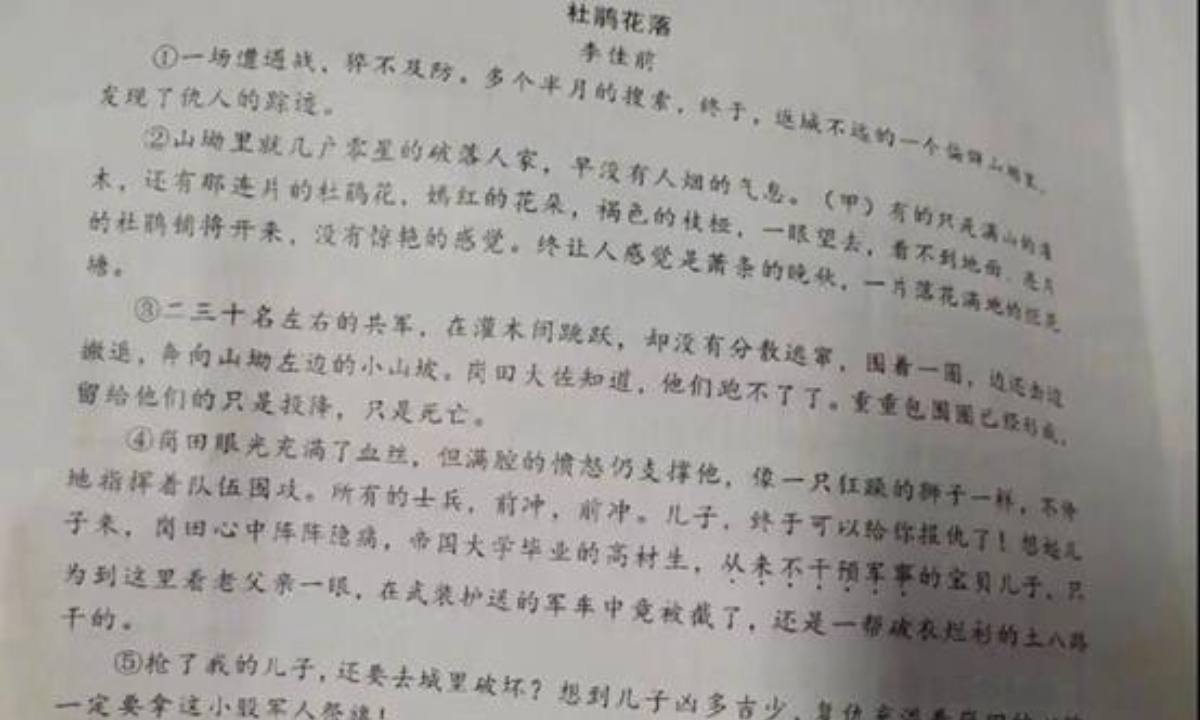MY READING LIFE / STUDENTS' WORKS
Paul Kalanithi’s book shows me struggle and profundity of life
Scalpels and words
Editor's Note:
"Read ten thousand books, and your pen will be guided as if by the gods" is an ancient Chinese idiom that can be seen in students' textbooks. China's Ministry of Education has published an action plan to further promote reading among students across the nation. With new and diverse book recommendations, the reading scene is expected to be revived not only at schools, but also across society. To contribute to this endeavor, the Global Times launched "My Reading Life" essay contest for middle school students.
Please pick up a pen and share your stories with us at reading@globaltimes.com.cn
Participants will be rewarded once the article has been selected.

Beautiful tragedy
When was the last time you blessed yourself with a moment of quiet reflection and put your worries on pause? When did you last settle down with a book and lose yourself in its pages, relishing in the rustling sounds as you turn them one by one?
For me, that moment came three years ago, when I stumbled upon Paul Kalanithi's When Breath Becomes Air. At first, I was hesitant to read it; after all, I thought I knew the story already. It was a book about death, a tragedy.
I don't know what compelled me to flip open its pages. Perhaps it was the picture of a surgeon in his blue hospital attire on the cover, which reminded me of my father's responsibilities as a cardiologist; perhaps the title left me wondering and curious about the author's relationship with medicine; perhaps it was the striking cover page review describing the book as "rattling, heartbreaking, beautiful," that left me intrigued.
Kalanithi reawakened me to the therapeutic practice of throwing away my phone and burying myself in a book. I was enveloped by the silence and security of my room as word after word sparked in me an urge to read voraciously. As I read, I was transported to a world of reflection, where his words spoke to me on a more personal level.
Kalanithi's memoir chronicles his journey from working as a prominent neurosurgeon to being a patient in a hospital gown diagnosed with stage four lung cancer at the age of 36. He shares glimpses into his childhood, the rigorous training he undertakes at the hospital, and the way his diagnosis shakes the foundations of his self-identity.
Kalanithi describes how he was just months away from the end of his residency. He had a promising career ahead of him, with several prestigious institutions offering him opportunities. Despite his cancer, which dispelled his medical career overnight, he could still find meaning in the present and approach death with integrity. He had hope in a place where I thought only darkness reigned, even when all else was shattered. Even in the face of his own mortality, Kalanithi's message was one of optimism and compassion.
Enchanting story
What is special about When Breath Becomes Air is not merely the heartbreaking story the author tells about his grappling with his fatal diagnosis. Rather, what stands out are his reflections, filled with hope and authenticity, that have the power to help readers reacquaint themselves with their goals, priorities, gratitude for life, and fragility. Everyone will find details that they can resonate with in these pages, whether it be Kalanithi's love of language, devotion to medicine, care for his family, unquenchable thirst for understanding life's purpose, or resilience after a setback.
When I first read Kalanithi's work, I was immediately captured by his experiences. I connected with him when he mentioned his reflections during his childhood about his physician father's responsibilities. I understood what he meant when he described how his father would take off to work in the mornings and come home late at night, sometimes just to a plate of reheated dinner. I empathized with his resolve to never become a doctor because of the way it would jeopardize the memories he could make with his family.
Yet, my tears really started flowing when he described his journey in medical school and during his residency. That was when I was able to partially understand his anxieties and worries as a budding physician and wondered whether my dad had felt the same way. Kalanithi's fears of making decisions for people that could result in the difference between life and death, and his attempts to guide his patients instead of treating them as a box to be checked off, brought me closer to my father, especially in his role as a doctor.
No matter the circumstance, Kalanithi exemplified the core value of carpe diem; he worked toward his dream of becoming both a father and an author despite time constraints in the face of his diagnosis.
With this book, Kalanithi examined the significance of his and others' lives. The book itself was a healing act and a tangible manifestation of the values he sought to live out in his life.
For Kalanithi, medicine was not a job. It was purely a way for him to approach the metaphysical questions he sought to understand through literature. Ironically, life brought him to the subject that had drawn him to medicine, and that he wanted to understand the most, up close: death.
Kalanithi faced death with elegance and poise. He left behind a legacy that has had (and still has) the potential to help many readers overcome their own challenges.
Bill Gates, the Guardian, the New York Times, and the Washington Post have all highlighted the timelessness of Kalanithi's rhetoric. Indeed, his story is truly relevant to anyone, even a high-school student in China who has no intent of studying literature, nor medicine.
Kalanithi pushed me to reflect on my own mortality and privileges. His exploration of the evanescence of time pushed me to ponder how I am living my life.
I recommend When Breath Becomes Air to anyone who cares about another person, wants to be inspired, or wants to explore a book filled with compassion, perseverance, and hope. This New York Times #1 bestseller and Pulitzer Prize finalist offers an exploration of what makes life worth living in the face of death.
When Breath Becomes Air is not just about dying. Rather, it is about truly living. We can't control when we knock on death's door, but we can control how we approach death. And, we can hope.
Be prepared to jump onto an emotional rollercoaster. Be prepared to contemplate the human condition - what it means to live and breathe.
Be prepared to close the book and find an indelible mark on the clarity and meaning in your life.
The musical, eloquent, and heartbreaking book is worth the emotional investment.
The author is a student at Beijing No. 4 High School International Campus.
"Read ten thousand books, and your pen will be guided as if by the gods" is an ancient Chinese idiom that can be seen in students' textbooks. China's Ministry of Education has published an action plan to further promote reading among students across the nation. With new and diverse book recommendations, the reading scene is expected to be revived not only at schools, but also across society. To contribute to this endeavor, the Global Times launched "My Reading Life" essay contest for middle school students.
Please pick up a pen and share your stories with us at reading@globaltimes.com.cn
Participants will be rewarded once the article has been selected.

Photo:VCG
We scramble through each day, drowned by the incessant deluge of work and responsibilities, while urged on by the unremitting tick of the clock. During the fleeting moments of respite in a line for lunch or on the subway back home, we often find ourselves reaching for our flat, sterile screens. Our fingers automatically click on Douyin and proceed to mindlessly scroll through videos; we aggressively punch in and send a flurry of emojis, accompanied by internet slang, to our friends. Our attention is packaged and sold to algorithms, leaving us feeling disconnected and unfulfilled.Beautiful tragedy
When was the last time you blessed yourself with a moment of quiet reflection and put your worries on pause? When did you last settle down with a book and lose yourself in its pages, relishing in the rustling sounds as you turn them one by one?
For me, that moment came three years ago, when I stumbled upon Paul Kalanithi's When Breath Becomes Air. At first, I was hesitant to read it; after all, I thought I knew the story already. It was a book about death, a tragedy.
I don't know what compelled me to flip open its pages. Perhaps it was the picture of a surgeon in his blue hospital attire on the cover, which reminded me of my father's responsibilities as a cardiologist; perhaps the title left me wondering and curious about the author's relationship with medicine; perhaps it was the striking cover page review describing the book as "rattling, heartbreaking, beautiful," that left me intrigued.
Kalanithi reawakened me to the therapeutic practice of throwing away my phone and burying myself in a book. I was enveloped by the silence and security of my room as word after word sparked in me an urge to read voraciously. As I read, I was transported to a world of reflection, where his words spoke to me on a more personal level.
Kalanithi's memoir chronicles his journey from working as a prominent neurosurgeon to being a patient in a hospital gown diagnosed with stage four lung cancer at the age of 36. He shares glimpses into his childhood, the rigorous training he undertakes at the hospital, and the way his diagnosis shakes the foundations of his self-identity.
Kalanithi describes how he was just months away from the end of his residency. He had a promising career ahead of him, with several prestigious institutions offering him opportunities. Despite his cancer, which dispelled his medical career overnight, he could still find meaning in the present and approach death with integrity. He had hope in a place where I thought only darkness reigned, even when all else was shattered. Even in the face of his own mortality, Kalanithi's message was one of optimism and compassion.
Enchanting story
What is special about When Breath Becomes Air is not merely the heartbreaking story the author tells about his grappling with his fatal diagnosis. Rather, what stands out are his reflections, filled with hope and authenticity, that have the power to help readers reacquaint themselves with their goals, priorities, gratitude for life, and fragility. Everyone will find details that they can resonate with in these pages, whether it be Kalanithi's love of language, devotion to medicine, care for his family, unquenchable thirst for understanding life's purpose, or resilience after a setback.
When I first read Kalanithi's work, I was immediately captured by his experiences. I connected with him when he mentioned his reflections during his childhood about his physician father's responsibilities. I understood what he meant when he described how his father would take off to work in the mornings and come home late at night, sometimes just to a plate of reheated dinner. I empathized with his resolve to never become a doctor because of the way it would jeopardize the memories he could make with his family.
Yet, my tears really started flowing when he described his journey in medical school and during his residency. That was when I was able to partially understand his anxieties and worries as a budding physician and wondered whether my dad had felt the same way. Kalanithi's fears of making decisions for people that could result in the difference between life and death, and his attempts to guide his patients instead of treating them as a box to be checked off, brought me closer to my father, especially in his role as a doctor.
No matter the circumstance, Kalanithi exemplified the core value of carpe diem; he worked toward his dream of becoming both a father and an author despite time constraints in the face of his diagnosis.
With this book, Kalanithi examined the significance of his and others' lives. The book itself was a healing act and a tangible manifestation of the values he sought to live out in his life.
For Kalanithi, medicine was not a job. It was purely a way for him to approach the metaphysical questions he sought to understand through literature. Ironically, life brought him to the subject that had drawn him to medicine, and that he wanted to understand the most, up close: death.
Kalanithi faced death with elegance and poise. He left behind a legacy that has had (and still has) the potential to help many readers overcome their own challenges.
Bill Gates, the Guardian, the New York Times, and the Washington Post have all highlighted the timelessness of Kalanithi's rhetoric. Indeed, his story is truly relevant to anyone, even a high-school student in China who has no intent of studying literature, nor medicine.
Kalanithi pushed me to reflect on my own mortality and privileges. His exploration of the evanescence of time pushed me to ponder how I am living my life.
I recommend When Breath Becomes Air to anyone who cares about another person, wants to be inspired, or wants to explore a book filled with compassion, perseverance, and hope. This New York Times #1 bestseller and Pulitzer Prize finalist offers an exploration of what makes life worth living in the face of death.
When Breath Becomes Air is not just about dying. Rather, it is about truly living. We can't control when we knock on death's door, but we can control how we approach death. And, we can hope.
Be prepared to jump onto an emotional rollercoaster. Be prepared to contemplate the human condition - what it means to live and breathe.
Be prepared to close the book and find an indelible mark on the clarity and meaning in your life.
The musical, eloquent, and heartbreaking book is worth the emotional investment.
The author is a student at Beijing No. 4 High School International Campus.



